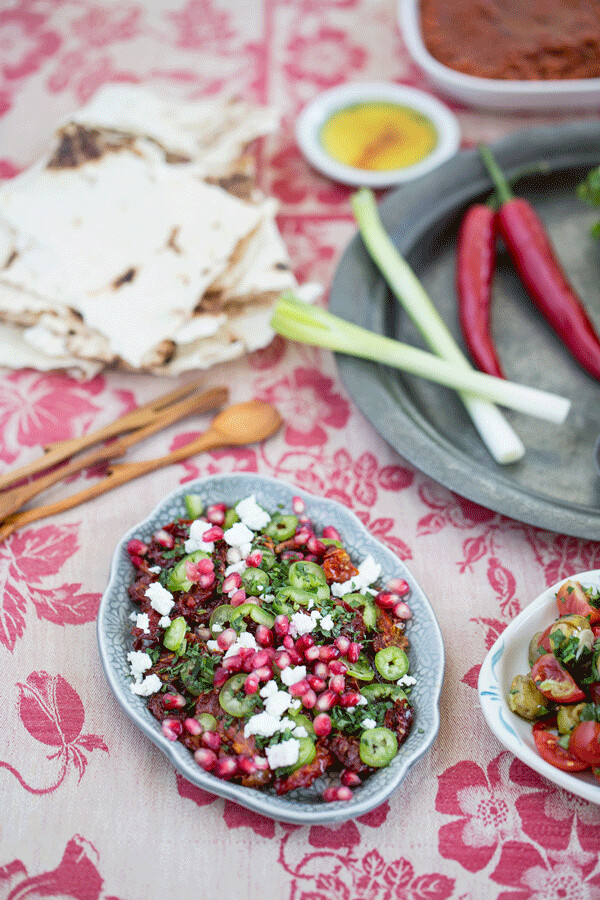News & Articles
Browse all content by date.

As holiday talk builds to a festive pitch, and the cold darkness moves to embrace you, don't sleep on pomegranate season. It's on, and ready to sneak back into your life.
With a fresh pomegranate in your palm, you have magic at your fingertips. Wave your hand, and food becomes more beautiful, more delicious and more exciting. Toss those juicy rubies on salad, soup, steak, linguine al funghi, Brazilian black bean soup, granola and yogurt. The flavor added by these fleshy seed packages, called arils, matches the color: sharp and sweet.
Those arils don't just make a pizzaz-y garnish, they can be used as the substance of a meal, as one would use rice or pasta: a plate of fried arils with eggs on top, for example, or a bowl of arils and salad. So can a bowl of plain arils, which looks like a bowl full of jewels and tastes like an unparalleled luxury.
Thus, the fall harvest is a time to rejoice in pomegranate country, a wide swath across the Old World and South Asia, from the Black Sea to the Bay of Bengal. In ancient orchards, the bright red orbs dangle brightly from these sacred trees like Christmas tree ornaments.
To the uninitiated, it won't be obvious how to extract the arils. Indeed there are many ways, and some are messier than others. Treating those globes like softball-sized pinatas might not seem like the cleanest option, but it turns out if you slice them in half and tap gently enough, the seeds rush out like Black Friday shoppers storming the gates of Walmart.
The technique comes from Turkey, where the Middle East meets Asia, and where one fall day a food writer named Robyn Eckhardt sat down with a group of women, 100 kilos of fresh pomegranates and some pieces of plastic pipe. They spent the day liberating the arils inside.
Here is Eckhardt's technique, as she recently emailed from Italy:
"Gently squeeze one pomegranate half, cut side down, over a wide deep bowl to loosen the seeds. Place it cut side down in your nondominant hand. Spread your fingers to create a 'sieve' through which the seeds can fall. With the handle of a wooden spoon or spatula, tap the pomegranate all over; dislodged seeds will fall, with the juices, into the bowl (the bits of bitter white membrane will remain in your hand). Continue tapping, turning the pomegranate in your hand, until most of the seeds are dislodged. If any white membrane has fallen into the bowl, pick it out. Strain the seeds from the juice; you can reserve the juice for another use."
The first time I tried this method, my open hand was powerless to stop the flow of arils, as if a floodgate had opened. But at least I had a bowl to catch them.
That day, Eckhardt and her friends were preparing nar eksisi, or Turkish pomegranate molasses. When made with 100% pomegranate juice and no additives, she says, it has as delicate and eye-opening a flavor as a fine balsamic. Among brands that an American could easily order online, Eckhardt's favorite is Mymoune, produced by a women's agricultural cooperative in Lebanon, followed by Cortas.
Pure pomegranate syrup is worth paying good money for, she says. It keeps forever and is versatile far beyond salad dressings: as a chicken wing glaze, a mixer, a sweetener for your morning oatmeal. If you can't get the good stuff, you might want to skip it.
There is a recipe in Eckhardt's book, "Istanbul & Beyond: Exploring the Diverse Cuisines of Turkey," that calls for both the arils and the syrup. Sun Dried Tomato and Pomegranate Salad comes from a restaurant in Antakya owned by her friend Shiraz Demir, a pomegranate and olive farmer.
"The dish perfectly embodies [Antakya's] location, with the Mediterranean climate represented in the tomatoes, olive oil and pomegranate, and the Levantine [western Asian] influences in the fresh herbs and chilies. It would usually be served as part of a meze [tapas-like] spread or for breakfast with other dishes."
The salad is an exciting ride, with many strong personalities balancing one another in spectacular fashion. Each bite is a different little drama, with spice, fat, herbs and salty chunks of cheese, all splashed with tangy pomegranate juice. It will brighten any table, any time of year.
Sun Dried Tomato and Pomegranate Salad
Serves 6 to 8 as a meze or 4 as a side dish
Eckhardt lays out this salad in a layered, eye-catching way, as it would appear as part of a spread. For simplicity, I prefer to mix the ingredients in a bowl. She was gracious enough to let me make a few minor tweaks, which I've made as parenthetical suggestions. The salad is forgiving, and you can alter the proportions widely to suit your taste.
20 sun-dried tomatoes
1 medium pomegranate, cut in half horizontally
1 hot green chile, such as jalapeno or Anaheim, sliced (In winter I prefer chili flakes, such as Aleppo)
¼ cup fresh mint or flat-leaf parsley, or a combination, chopped finely
¼ cup crumbled lightly salty white cheese, such as Bulgarian feta
¼ cup fruity olive oil
1 tablespoon pomegranate molasses (If you can get the pure stuff. Otherwise use lemon juice)
Soak the sun-dried tomatoes in warm water until soft and pliable, 10 to 20 minutes.
While the tomatoes are soaking, seed the pomegranate.
Drain the sun-dried tomatoes and pat dry, then slice (or cut with kitchen scissors) into ¼-inch-wide strips.
Arrange the tomato strips on a small plate and top with pepper slices (or chili flakes). Sprinkle over the mint or parsley, and then the cheese and pomegranate seeds. Drizzle over the olive oil and pomegranate molasses and serve immediately.

| Tweet |


